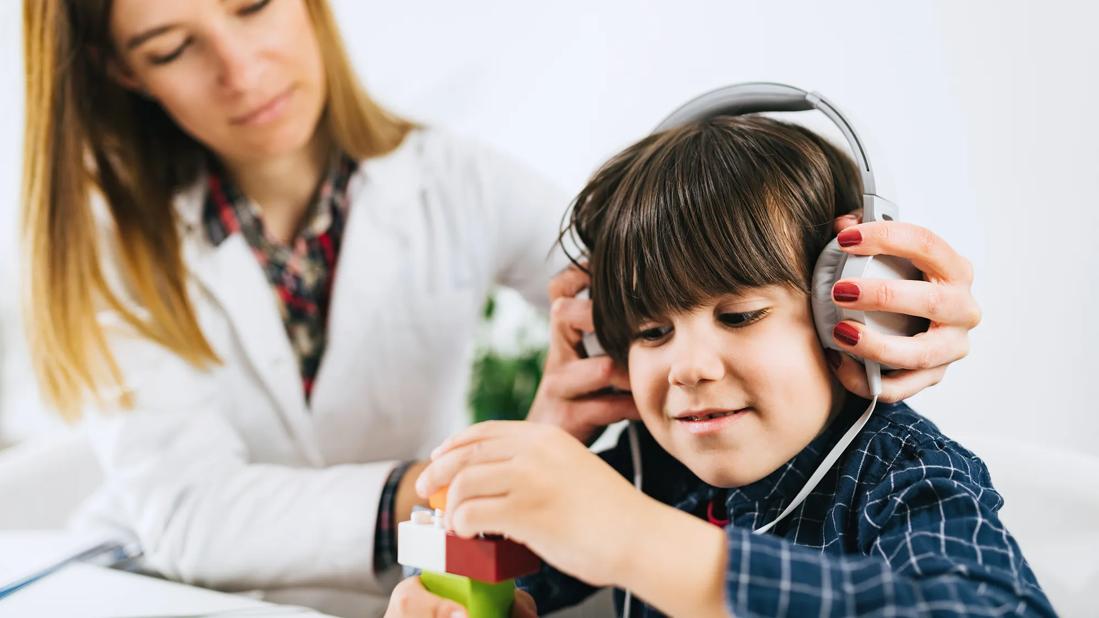Routine screenings at school are normal and important

It’s pretty typical that kids will have hearing screenings in school. Knowing if your child has trouble hearing is important for their learning experience after all. It’s also key for their lifelong well-being.
Advertisement
Cleveland Clinic is a non-profit academic medical center. Advertising on our site helps support our mission. We do not endorse non-Cleveland Clinic products or services. Policy
But what exactly does a school hearing test look for? And what happens if it identifies a concern?
Pediatric audiologist Donald Golberg, PhD, has answers.
Most kids have their first hearing screening at school sometime between preschool and first grade.
During the test, an examiner — like a school nurse or an audiologist — will put headphones on your child’s ears. They’ll present sounds at different volumes, frequencies or pitches into the headphones, and they’ll instruct your child to respond when they hear the sound.
If the screening shows they’re hearing as well as expected, they pass the test. If the screening shows any concerns, you’ll be advised to schedule a comprehensive hearing test with an audiologist.
If your child passes the school hearing screening, you can be confident their hearing is as it should be. If it’s recommended that they see an audiologist, you don’t have to immediately assume the worst.
“These screenings only indicate that on that day, in that test environment, they didn’t pass the screening,” Dr. Goldberg clarifies. “Many factors in the initial screening can impact the results. So, just think of the next step as precautionary — a needed step to rule out the possibility of hearing loss.”
Advertisement
Common issues that affect the accuracy of hearing screenings include:
If your child’s school hearing screening identifies a concern, seeking an evaluation with an audiologist is important. If you’re unsure who to contact, your child’s school or pediatrician may have a recommendation for where to seek audiology services.
A comprehensive audiologic evaluation will determine if your child’s hearing is within normal range or if they’re experiencing hearing loss.
Like during their school screening, your child will listen and respond to sounds. But this time, the test will take place in a highly controlled and calibrated test environment. Reinforce to your child that it’s important to pay attention and listen to the instructions closely during testing.
The earlier that hearing loss is identified, the earlier a solution can be found. So, if your child is recommended for a full hearing test, it’s important not to brush it off.
Some parents and caregivers are surprised to learn that their child isn’t hearing as well as they should. That’s especially true for children with mild hearing loss or hearing loss in only one ear (unilateral hearing loss).
“Your child might still function well, but even mild hearing loss can put your child at risk for trouble keeping up with conversation at school and throughout their lives,” Dr. Goldberg stresses.
If the test confirms that your child has hearing loss, your provider can help identify causes and appropriate next steps. Often, childhood hearing loss is due to things like undiagnosed or untreated middle ear infections and fluid buildup in your child’s middle ear.
Advertisement
If the cause of hearing loss is due to a temporary change, like a middle ear infection, medical intervention can address and resolve it. If the loss is more permanent, audiologists will recommend appropriate options.
Don’t hesitate to contact your child’s healthcare provider if you notice signs of hearing loss at any time. Possible red flags include:
Proper hearing is important for your child’s development and safety. So, don’t wait to seek further care if your child’s school hearing screening recommends follow-up testing.
Advertisement

Sign up for our Health Essentials emails for expert guidance on nutrition, fitness, sleep, skin care and more.
Learn more about our editorial process.
Advertisement

Most kids start losing baby teeth around age 6 — but there’s some wiggle room in the timeline

From playful movement to strength-building, kids need exercise to stay healthy and strong

Combat summer learning loss and keep young brains engaged with low-pressure learning

Heap on the praise for a job well done and stay consistent

Have their eyes evaluated shortly after birth, before their first birthday, and at ages 3, 5 and beyond

Teaching kids how to share at the appropriate age can help them develop social skills and manage their emotions

By disrupting a child’s ability to think and act for themselves, snowplow parents run the risk of delaying their child’s ability to learn

Creating a pal in their mind can help children learn social skills, overcome fears and build creativity

Even small moments of time outdoors can help reduce stress, boost mood and restore a sense of calm

A correct prescription helps your eyes see clearly — but as natural changes occur, you may need stronger or different eyeglasses

Both are medical emergencies, but they are very distinct events with different causes